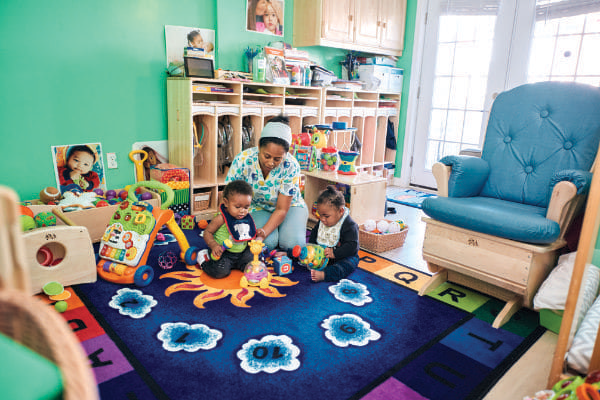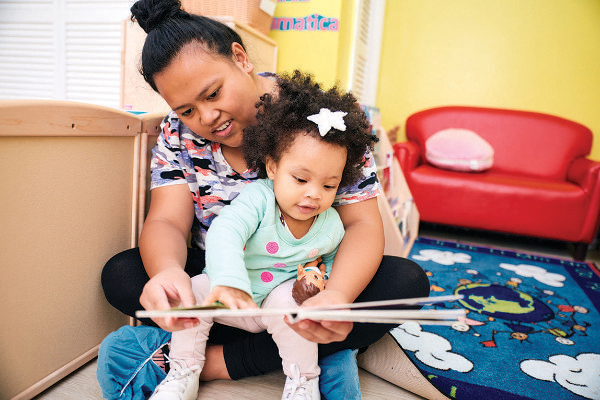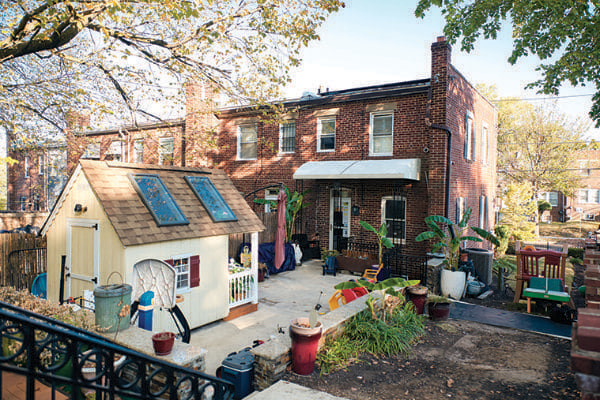When children receive care and education in a safe, high-quality environment, it can positively affect their healthy development and long-term well-being. That’s why facility quality is a centerpiece of our Early Learning work in the District of Columbia’s Wards 7 and 8.
Our support for early learning programs includes training and technical assistance on facility related topics such as room layout, learning materials, furnishings, and health and safety. We also fund facility improvements through the Early Learning Quality Fund (ELQF), a $3.8 million fund sponsored by the Foundation and managed by our partners Reinvestment Fund and Public Health Management Corporation.
We include family child care homes in this work (along with larger, center-based settings) because these homes are a critical component of the local early learning landscape and are more likely to serve infants and toddlers, ages 0 to 3.
Renita Hill, who has operated Angel’s Arena Child Care in Ward 8 since 2007, has experienced the benefit of both. At one point, her program space featured an abundance of open space in the center of the rooms, with all furniture and supplies ringing the perimeter. Walk into her home today and you’ll find a series of distinct yet connected spaces designed to support social-emotional development, literacy, scientific exploration and more. All materials and books are age-appropriate and stored at a toddler’s eye level for easy access. Instead of placing imaginary play dress-up items in closed storage containers, Ms. Hill hangs them in mini wardrobes so children can reach them on their own. Each section is clearly defined with signs in both English and Spanish, and important touches, such as stuffed animals in the reading nook to make it cozy and inviting, are in place.
What sparked this change? Ms. Hill received guidance from a peer mentor who had been trained by the Foundation and who had made similar improvements in her own home-based early learning program. In one of their first sessions, the peer mentor challenged Ms. Hill to rethink and reconfigure her space, selecting and arranging items to best meet the needs and interests of the young children she serves. It took hours of intense work, but Ms. Hill was thrilled with the changes, and the children responded positively to the more engaging environment.
Ms. Hill also has received a forgivable loan from the ELQF as well as technical assistance to help plan and prepare for a facility upgrade. She plans to expand and remodel her basement (including the addition of a bathroom and kitchenette), add a sliding-glass door and sidewalk for access to the backyard, and replace the fence in her backyard. These improvements supplement changes Ms. Hill has made on her own, including adding a two-story playhouse in her backyard. The basement project will add 320 square feet of space for her program, allowing her to increase her capacity from six to 12 children over both traditional and nontraditional (nights and weekends) hours.

Muluwork Kenea
In Ward 7, Muluwork Kenea, operator of Amen Family Child Care, also completed a construction project with the ELQF’s support, repurposing a garage at her home to create more space tailored specifically for infants. The addition of a paved area in her backyard gives children more room for activities such as riding bikes and kicking balls. Like Ms. Hill, she also received technical assistance to help her make improvements to her room layout and furnishings. These steps have improved her facility quality rating and led to a waiting list of families interested in enrolling their children in her program. Currently providing care and education for nine children, Ms. Kenea has applied for zoning and licensing to serve 12.
“Facility quality is an often overlooked aspect of early learning quality,” says Marica Cox Mitchell, Director of the Foundation’s Early Learning Initiative. “The right environment provides the space, materials and furnishings young children need to grow and thrive. That’s why facility investments are a key part of our commitment to enhancing the quality and capacity of early learning programs in our community.”



